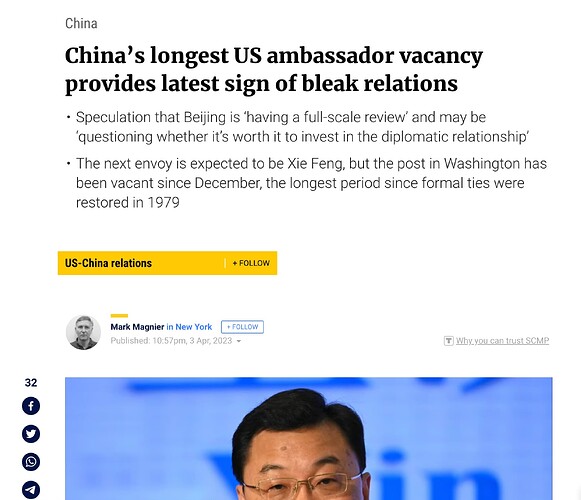-
北京已经有三个多月没有在华盛顿派驻大使,这是1979年美中关系正常化以来最长的一段时间。这反映了两国关系的惨淡状况,并可能预示着中国将认真反思如何与美国打交道。3月24日,谢锋在北京会见美国高管时发挥了重要作用,这表明谢锋是下任大使的人选。外交专家说,谢锋的授职没有问题,北京也没有内部审查的困难。
-
寒意是对等的,美国驻北京大使尼古拉斯-伯恩斯在争取接触中国高层官员的过程中也面临类似的闭门羹。上一次该职位长期空缺是在1995年6月,在华盛顿允许台湾总统李登辉在紧张的选举前访问美国后,北京将其大使李道豫召回了两个月。中国也认识到,对许多美国官员来说,如今只要与中国大使会面就会产生政治问题,从而导致任命大使的工作被推迟。
-
中国目前正在对美国的政策进行审查,并且正在努力评估谢锋是否能够驾驭当地的环境,或者是否必须从北京设计一个根本的外交政策转变。反华立法的暴风雪,"包围 "军事联盟和伙伴关系的网络,以及美国习惯于在镜头前进行大部分外交活动,使情况变得更加复杂。北京担心他们经验丰富的高级特使会在美国首都面临类似的待遇,从而破坏中国认为它应该得到的尊重。
-
国务卿安东尼-布林肯分别在日内瓦和阿拉斯加与中国外交事务负责人王毅和杨洁篪对峙。据弗里曼说,这是由于一个文化问题造成的: “面子”。美国支持台湾的军事防御和国际存在,这些目标是北京反对的。中国对美国对其缓解紧张局势的努力缺乏回应感到沮丧。
-
11月在印度尼西亚举行的20国集团会议期间,习近平主席和拜登就一项部长级访问计划达成一致,最后是习近平在今年11月前往旧金山参加亚太经济合作组织峰会。然而,由于中国的一个监视气球穿越美国,布林肯取消了他的行程,而习近平还没有在华盛顿没有动静的情况下完成他的行程。分析人士认为,延迟的原因可能是习近平上个月高调访问莫斯科,以及他需要签署所有部长级的职位。
-
美国在北京没有大使是有实际代价的,因为特使是国内政策制定者的眼睛和耳朵。没有大使,外交关系就无法改善。中国在这场大流行病之后一直在进行外交活动,比如习近平为结束乌克兰战争而提出的12点和平计划,以及向更多国家开放金砖国家集团。
-
Beijing has been without an ambassador in Washington for more than three months, the longest period since US-China relations normalised in 1979. This reflects the dismal state of the nations’ ties and potentially signals a serious rethink of how it engages with the US. Evidence that Xie Feng is the choice for the next ambassador was seen when he played a prominent role in meeting US executives on March 24 in Beijing. Diplomatic experts say there is no problem with Xie’s agrément, and Beijing has no internal vetting difficulties.
-
The chill has been reciprocal, with the US ambassador to Beijing, Nicholas Burns, facing similar closed doors in his bid to gain access to top Chinese officials. The last time the post remained empty for a lengthy period was in June 1995 when Beijing recalled its ambassador, Li Daoyu, for two months after Washington allowed the Taiwanese president, Lee Teng-hui, to visit the US in advance of a tense election. China also recognises that for many US officials, simply meeting with a Chinese ambassador these days is politically problematic, leading to a delay in appointing an ambassador.
-
China is currently undergoing a review of US policy, and is struggling to assess whether Xie can navigate the environment on the ground or whether a fundamental foreign policy shift must be engineered from Beijing. This is compounded by a blizzard of anti-Chinese legislation, a web of “encircling” military alliances and partnerships, and a US habit of conducting much of its diplomacy in front of cameras. Beijing is concerned that their experienced, high-ranking envoy could face similar treatment in the US capital, undermining the respect China believes it is due.
-
Secretary of State Antony Blinken faced off with Chinese foreign affairs chiefs Wang Yi and Yang Jiechi in Geneva and Alaska, respectively. According to Freeman, this is due to a cultural issue: “face”. The US supports Taiwan’s military defence and international presence, objectives that Beijing opposes. China is frustrated with the US’s lack of response to their attempts to reduce tensions.
-
During the G20 meeting in Indonesia in November, President Xi Jinping and Biden agreed on a plan for ministerial visits, capped by a trip by Xi to San Francisco for the Asia-Pacific Economic Cooperation summit this November. However, Blinken cancelled his trip due to a Chinese surveillance balloon crossing the US, and Xi has yet to make his trip without movement from Washington. Analysts believe the delay may be due to Xi’s high-profile trip to Moscow last month and the need for him to sign off on all ministerial-level positions.
-
The US’s lack of an ambassador in Beijing has practical costs, as the envoy serves as the eyes and ears of policymakers back home. Without an ambassador, diplomatic relations cannot improve. China has been engaging in diplomatic activity coming out of the pandemic, such as Xi’s 12-point peace plan to end the Ukraine war and opening the BRICS grouping to more nations.
